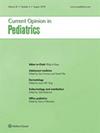Bivalirudin in pediatric extracorporeal membrane oxygenation
Abstract
Purpose of review This review summarizes the current literature surrounding the use of bivalirudin as an alternative anticoagulant for pediatric extracorporeal membrane oxygenation (ECMO) patients. Recent findings Recent single center studies describe that bivalirudin may be associated with decreased blood product transfusion, decreased cost and similar clinical outcomes for pediatric ECMO patients who have failed unfractionated heparin (UFH) anticoagulation. aPTT is the most common test to monitor bivalirudin but has several limitations. Other tests including dilute thrombin time (dTT) and viscoelastic assays are promising but more study is needed. Current evidence suggests that bivalirudin is a well tolerated and effective alternative anticoagulant for pediatric ECMO patients who have failed UFH anticoagulation but prospective studies are needed to confirm these results. Summary Bivalirudin is a promising alternative anticoagulant for pediatric ECMO patients who have failed UFH. Large prospective, multicenter studies are needed to confirm safety and efficacy.





